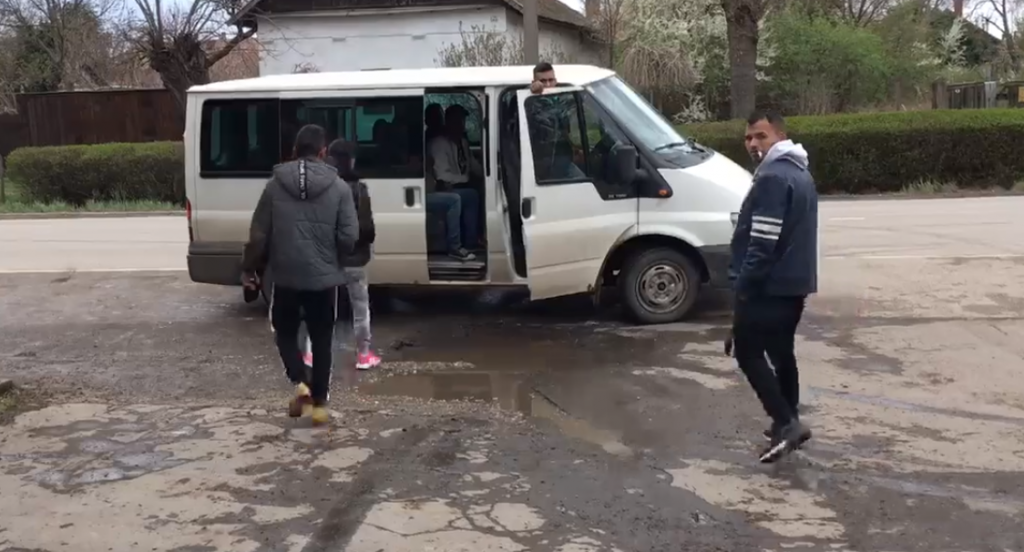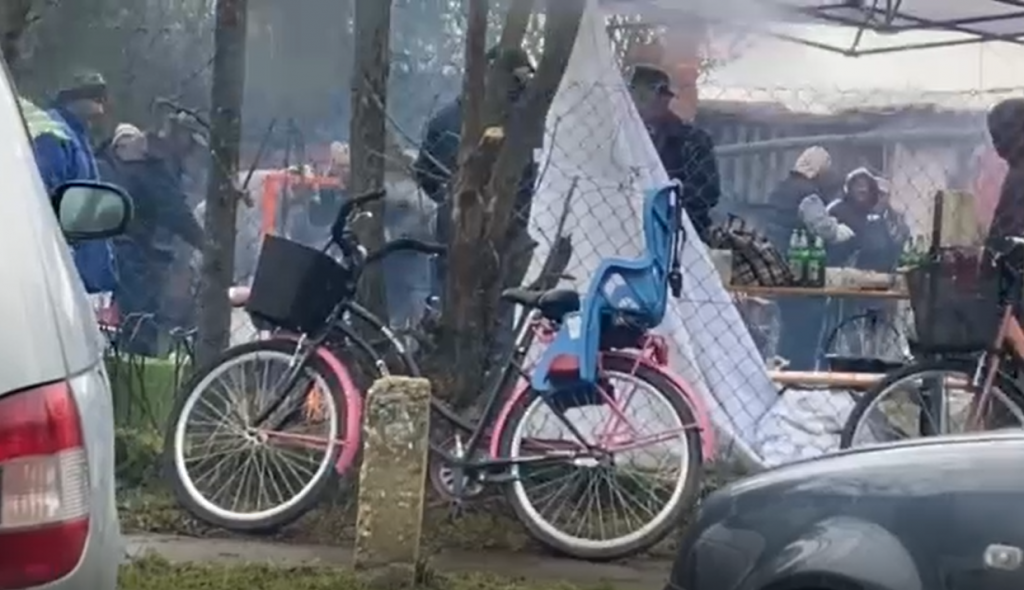The https://english.atlatszo.hu use cookies to track and profile customers such as action tags and pixel tracking on our website to assist our marketing. On our website we use technical, analytical, marketing and preference cookies. These are necessary for our site to work properly and to give us inforamation about how our site is used. See Cookies Policy
Votes for money or food, chain voting – election fraud recorded across the country
Several incidents of suspected electoral fraud were recorded by observers during Sunday’s parliamentary elections in various regions of Hungary. Most cases point to vote-buying, largely involving the impoverished Romani population. Despite the reports, unless the police or the prosecution launches in-depth investigations about each case – which normally does not happen – it is unlikely that there will be any consequences.
In this year’s parliamentary elections in Hungary, there was a record number of polling officials and observers working outside the polling stations to monitor the legality of the vote. Despite this, observers reported many irregularities, such as chain voting, vote buying and voter tampering. Multiple suspicious cases were also recorded by Atlatszo correspondents.

Voter bus driver threatens voters a vote counter in Karcag from atlatszo.hu on Vimeo.
In this election, there were opposition delegates on almost every electoral commission, most of them organized by the group 20,000 for a Clean Election 2022 (20K22). However, the most common types of electoral fraud can hardly be detected by the delegates working at the polling station, since they do not know, for example, whether the voter will take a photo of their ballot paper or take it out to show it to someone for money. Typical election crimes are committed in the street or in a nearby building (such as a pub) rather than at the polling station.
Such fraud can be detected by so-called outside observers – activists working on the streets to monitor abuses. Examples of such observers have been 20K22, some international observers (OSCE, European Network of Election Observation Organisations, Progressive International) and the Clean Vote campaign. Clean Vote reported several cases of suspected election fraud – according to their activists, out of the 9 counties they were present in, they reported serious irregularities to the authorities in 5.
A vote is worth 5000 forints
Átlátszó correspondents were also present in two settlements in North-Eastern Hungary, which is one of the poorest regions in the country. In the Bánszállás district of Ózd and the village of Farkaslyuk in Oz, the majority lives below subsistence level, mostly on public works. Locals in the Ózd district say that both Fidesz and opposition parties have tried to buy votes, the former offering 5,000 forints, the latter a box of cakes and a bottle of wine. In the district, Gábor Riz of Fidesz won 77% of the votes.
In Farkaslyuk, cars made several U-turns to take voters to the polls, and drivers were quick to flee when Átlátszó correspondents began filming their activities. This itself could be an electoral offence: according to the electoral law, it is forbidden to transport people in the same car for more than one turn.
One public worker in the village also reported blackmailing: ‘I was told in the morning that I had to vote for the opposition candidate, Gábor Kiss, otherwise there would be no work for the month and my job would be ruined, they said they would check to see who I had voted for on the paper. It makes a difference whether I make 100,000 forints or only 23,000.”
According to observers’ reports, electoral violations continue to occur in the poorest areas of the country, typically involving people living in extreme poverty. In the poorest settlements, Fidesz has been a winner: according to G7.hu, in 2018, more than 80 percent of the 20 Hungarian settlements with the lowest average income voted for Fidesz candidates. If we look only at the 10 poorest settlements, on average 96 percent of voters in those settlements voted for Fidesz.
Reports of threats
Suspicious activities started already at the beginning of the voting: on Sunday morning, observers at the polling station in Solymár detected chain voting, where a minibus made several turns transporting people to polling station, with what looked like a pre-completed ballot paper. Chain voting is a vote buying scheme in which the perpetrator gives the voter a pre-voted ballot, the voter submits the ballot, and then after leaving the polling place, sells his blank ballot to the crook, who votes it and then gives it to the next participant.
OSCE observers and an Atltaszo field reporter tried to notify the chairman of the local electoral commission, who in turn barred them from the vincinity of the polling station and pushed our reporter. The case led opposition politician Bernadett Szél to file a complaint on suspicion of chain voting.
In another video recording sent to Átlátszó, a conversation suggesting vote-buying can heard. “You take a photo, you come out, they give you the ten thousand forints. […] Five of us turn it in, fifty thousand” – an unknown person instructs voters. The footage was taken in Onga, Borsod-Abaúj-Zemplén county, by the 20k22 election observation group.
Also talking about vote-buying was Mónika Sápi, the opposition candidate for constituency 4 in Szabolcs-Szatmár-Bereg county, who photographed a van with Ukrainian license plates and the group gathered around it. According to the oppositon candidate, a voter was being handed five thousand forints by the organizers, who told him “to vote for Fidesz.”
Votes for meat
Police were called to Makó, in an important swing district where the Fidesz candidate János Lázár was running against the opposition leader Péter Márki-Zay. Here, activists from the Clean Voting election monitoring group noticed cars transporting voters between polling stations and a private compound. The activists were told that at the site (where they were not allowed to enter due to a “private event”), pork was being distributed to voters for their vote for János Lázár.
Dóra Csepregi, a coordinator of the Clean Voting project, told Átlátszó that observers on the scene saw 5-6 cars taking voters from polling stations to the site. “We called the police in the morning, and they came out around 3 o’clock and started investigating. The cars disappeared after that” he said. Later, however, after the police left, “the meat-for-vote program resumed in Makó.” Later, people who came for meat did not deny to a reporter that they accepted food and were told to vote for János Lázár, although one of their interviewees said, “We don’t need meat, we voted for Fidesz without it, just like four years ago.”
Átlátszó filmed a chain vote
In Putnok, Átlátszó’s correspondent took a video of what appears to be chain voting in front of the polling station. The footage shows voters coming out of the building, walking across the road and handing a white sheet of paper – presumably the ballot paper – to the man in the car through the window. The voters then shook hands with a man in a white cap who was standing next to the car, presumably to receive their reward.
Láncszavazást videóztunk a putnoki parkolóban from atlatszo.hu on Vimeo.
Rarely is there a consequence for fraud
There is no information yet on how many cases of fraud could result in prosecution. In a report published the day after the elections, the OSCE also wrote that although some election complaints were handled properly by the electoral authorities, in many cases they did not provide effective redress.
In the past, complaints about election fraud rarely led to the annulment of votes or a rerun of the election. After the last parliamentary elections four years ago, there were no examples of re-voting, despite numerous complaints. After the 2019 local elections, voting was repeated in two places, Komló and Jászberény. In both cases, this led to a different candidate winning.
Even more worrying is the election authorities’ unwillingness to address the abuse of postal votes: the National Election Committee announced on Sunday afternoon that it would not investigate the apparent discarding of postal votes found in Târgu Mures, Romania, arguing that the Electoral Procedures Act only gives them jurisdiction in the territory of Hungary.
This means that there is currently now effective mechanism to ensure the security of mail-in ballots, which can even be legally collected and delivered and handled by anyone, including political activists. In Vojvodina, for example, where the pro-Fidesz Hungarian Association of Vojvodina (VMSZ), Átlátszó uncovered systemic abuses. Envelopes containing ballot papers are reportedly regularly opened and ballot papers manipulated.
Written and translated by Zalán Zubor. The Hungarian version of this story is available here. Cover image: 20k22 video, screenshot
Hungary. What do you know about Hungary? from atlatszo.hu on Vimeo.
Share:
Your support matters. Your donation helps us to uncover the truth.
- PayPal
- Bank transfer
- Patreon
- Benevity
Support our work with a PayPal donation to the Átlátszónet Foundation! Thank you.
Support our work by bank transfer to the account of the Átlátszónet Foundation. Please add in the comments: “Donation”
Beneficiary: Átlátszónet Alapítvány, bank name and address: Raiffeisen Bank, H-1054 Budapest, Akadémia utca 6.
EUR: IBAN HU36 1201 1265 0142 5189 0040 0002
USD: IBAN HU36 1201 1265 0142 5189 0050 0009
HUF: IBAN HU78 1201 1265 0142 5189 0030 0005
SWIFT: UBRTHUHB
Be a follower on Patreon
Support us on Benevity!


